#and how its supporters argue for the evilest possible things
Text
I don't think anything has shown media bias more strongly than the time a few years back when Women's March people got upset at the pro-lifers, because, "How dare you host your pro-life rally on the same day as our Women's March?" only to be told, "We've been doing this on this date since the '70s, with turnouts several times larger than your Women's March ever had, yet you've never heard of ours while yours dominates every cable news station for days."
#pro life#i'm having one of my days of overwhelming rage toward the institution of abortion#and how its supporters argue for the evilest possible things#including aborting infants at nine months of pregnancy#where there is literally no difference to the woman between aborting or delivering a live baby#except that with abortion you murder the kid first#and they take this pure evil position and claim to be heroes supporting women#rather than cartoon evil overlords murdering babies#and they get away with it!#and talking about the point in the main post is my way of turning my focus to something#that is still bad but less all-consuming rage-filled despair
66 notes
·
View notes
Photo
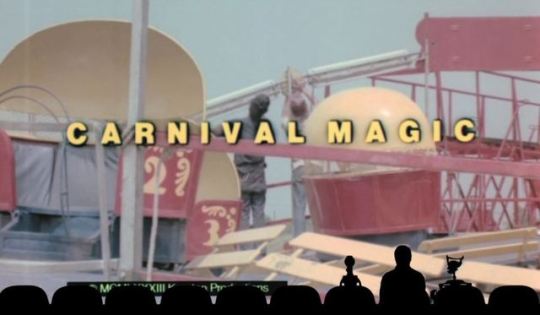
1112: Carnival Magic
Those of us who have heard of Al Adamson tend to associate him with movies like Psycho-A-Go-Go and Blood of Dracula’s Castle, so it’s weird to see him trying to make a family-friendly talking animal movie. He fails at it, of course, but I don’t think that’s got anything to do with the genre. Al Adamson just wasn’t any good at making movies.
Markov the Magnificent is a carnival magician who can talk to animals. You’d think he’d use that in his act but instead he mostly just annoys the other performers until they insist he be fired. This leads to the secret coming out… but it’s not Markov’s powers that are revealed, it’s those of his buddy Alex the Chimp, an animal who can talk to people. With Alex on stage, and Markov finally using some of his mind-reading and spoon-bending abilities, the carnival is suddenly the biggest thing in town. Unfortunately, some of the attention they attract is the wrong kind, like that of a scientist who would like nothing better than to dissect a live chimpanzee, I guess just because it’s the evilest possible thing to do.
Out of curiosity, have any of you ever seen a chimpanzee in a zoo? If so, you may have been surprised that it didn't look like the ones you see in movies. Movie chimps are skinny and pink, while zoo chimps are dark grey and look like they could tie you in a knot with one hand while lifting a small car with the other. Why is that? Because every chimp you've ever seen in a movie, tv show, commercial, or circus is less than about seven years old. When chimps reach puberty they not only become much bigger and stronger, they quickly realize that humans are smaller and weaker, and it gets very difficult to convince them to wear cute costumes anymore.
A movie about saving a talking animal from evil scientists so he can pursue a career in show business sounds like it ought to be fun, I guess. It would probably work better as a cartoon, where we could be confident that no real animals were abused in the making of it. Even so, most of what actually happens in Carnival Magic is just kind of dull and depressing. Occasionally you do get an attempt at something ‘zany’, but it never quite lives up to the kind of antics a description of the plot would lead you to expect. When Alex decides to steal a car and go for a joyride, for example, that sounds like it ought to be funny, but it somehow just never works. The music is an oddly un-fitting banjo piece and the screaming girl in the back seat reminds us constantly how dangerous this would be in real life.
(If you’ve ever tried to look up this movie on Wikipedia, by the way, you will have doubtless discovered that Carnival Cruise Lines owns a ship called the Carnival Magic. Should I ever find myself on board, I believe I will decline any offer to dine with the captain.)
When Alex is not getting up to supposedly hilarious hijinks, the movie has two modes. One is pastel people wandering around the carnival apparently having fun, and the other is the various characters telling us about their traumatic backstories. Markov’s pregnant wife died in a car wreck, leaving him with nothing but a talking ape and a broken heart. Stoney the carnival owner forces his daughter to dress and behave like a boy so she won’t remind him of the wife who left him. The carnival publicist ran away from home to escape a controlling and abusive father, and so on.
Of course you can make movies about this stuff. People make some very good movies about this stuff. Most of those movies, however, do not include scenes of chimpanzees wearing bras on their heads. Seeing this kind of material in Carnival Magic makes it feel like we just tuned in to that hilarious sitcom our friends have been urging us to watch, only to catch the Very Special Episode in which one of the characters did drugs or had cancer and then it was never mentioned again.
I think the ending is supposed to be about the entire carnival coming together to save Alex from the evil scientist, but we haven’t seen any sign that Alex has unified them. The people around Markov are already his friends and already committed to the survival of the carnival as a whole. If Alex had inspired carnies who were on the point of running away to become accountants or something to remain with the show that would be one thing, and they do succeed in saving Alex, but the scene is presented as if it’s a climax without a story. It’s also absolutely ridiculous watching the carnies sneak up on the secret chimp dissection lab, because they’re all very ordinary, out-of-shape people in street clothes doing their best to act like they’re on a police raid.
The evil scientist, Dr. Poole, is kind of a strange inclusion, himself. In my review of Octaman I remarked on how a lot of movies set up a conflict between scientists who want to study something and showpeople who want to ruthlessly exploit it. The 70’s King Kong remake is a pretty good example, but in that movie – and in many others – those who want to put some oddity on display for money are the bad guys and those who want to learn from it are good. Carnival Magic inverts this by suggesting that to study something is to destroy it, whereas to show it off is to help it be enjoyed by all the world.
There is a point to be made here. A fair bit of what we know about anatomy and physiology of both humans and other creatures has been learned by doing atrocious things to both the living and the dead. I don’t think, however, that Carnival Magic was the right way to make that point. For one thing, Dr. Poole’s desire to dissect Alex alive makes no sense. It’s not Alex’ physiology that makes him remarkable, it’s his behaviour. Watching him alive could surely teach us infinitely more than taking his corpse apart.
For another, the options we’re given is Alex being a specimen or Alex being a literal circus freak! Arguing that science should leave an animal alone to live out a happy life in its natural habitat seems reasonable – telling science to leave the same creature alone so it can perform for crowds of strangers is kind of horrifying. It’s like if Free Willy ended with the titular whale returned to the aquarium having been saved from a taxidermist or something. Sure, it’s better than death, but the audience still knows that this is not what’s best for this creature. If we’re supposed to believe that Alex wants to be a star, then that should have been established at the beginning of the movie, perhaps by him escaping Markov’s trailer and trying to entertain people. One or two short extra scenes about this would have made the whole arc much more palatable.
Several characters describe Alex as being something more than an animal, so I think we’re supposed to regard him as a character in his own right. This doesn’t seem entirely successful, because Alex doesn’t come across as having goals or desires of his own. He happily goes along with whatever Markov wants to do, and when Markov’s not around he wanders about getting into mischief with no real sense of direction. Part of me wants to believe this is an intentional attempt to portray a non-human mind that simply doesn’t prioritize the way we do. Another part just wants to call it bad writing and I’m not sure which I ought to listen to.
As characters go, Markov’s not a great one, either. Main characters in a movie ought to have a chance to learn and change, but Markov is pretty much the only human in the movie who doesn’t. Ellen learns to break free of her father and become her own person, and Stoney learns that she can still love him regardless. Dave the PR guys learns to be patient with women. Kirk the tiger tamer grows more bitter and hateful until it destroys him, while his girlfriend Kim comes to realize what an ass he is. Markov is exactly the same at the end as he was at the beginning – a guy with weird powers that he doesn’t put to any good use, and a talking ape for a surrogate child. Perhaps nearly losing Alex is supposed to show him how much the chimp meant to him, but he already spent half the movie telling us that Alex is all he has. He knows he’s got issues related to the death of his wife but seems unwilling to move past them.
In my review of Cry Wilderness I noted that it edged out Carnival Magic for the coveted title of ‘Worst Fucking Movie of Season 11’ mainly by being more racist. There’s a bit of racism in Carnival Magic, too, and it’s got a similar flavor although it’s not nearly so all-pervasive. Cry Wilderness had its slightly magical Native Americans, here to help and support the white people. Carnival Magic mostly cannot be bothered to have anybody who isn’t white say lines, but it still manages to have its slightly magical Buddhist Monks who raised Markov and presumably taught him his powers. This is dumb, and actor Don Stewart sounds like even he doesn’t believe it.
Considered as a whole, Carnival Magic is pretty messy and never manages to settle on a tone. Alex’ antics, Kirk’s revenge, and the various personal stories don’t quite feel like they’re all part of the same narrative. If I go back to that ‘sitcom’ metaphor, it’s like several episodes combined into a movie, but instead of being stitched end-to-end like in Riding With Death, they’ve been intercut to look like they’re all going on at once and it still doesn’t feel like a unified whole. Yet for all that, there’s something weirdly fascinating about it. Maybe it’s the contrast between the cheerful carnival setting and the often dark personal stories. Maybe it’s trying to puzzle out what Adamson hoped to accomplish by the juxtaposition. Whatever it is, it’s another reason I’d rather re-watch this than Cry Wilderness.
27 notes
·
View notes
Photo
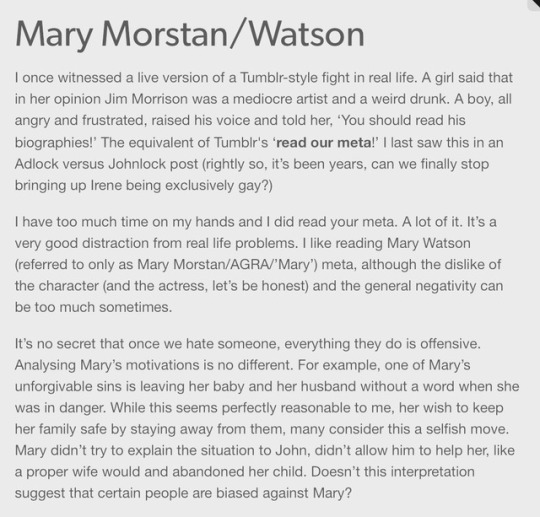
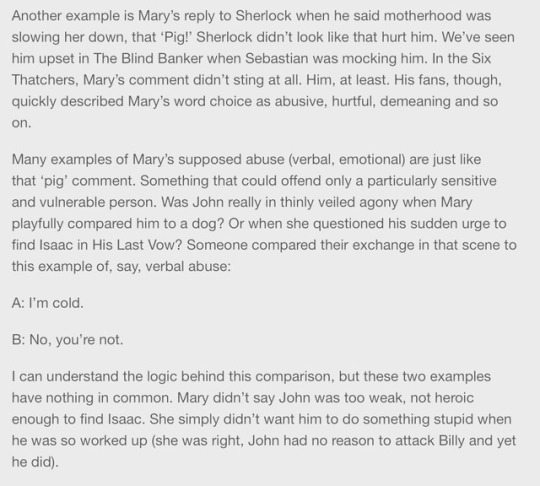
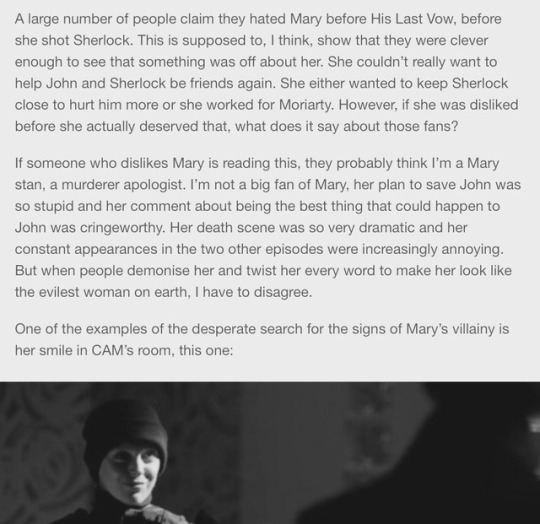
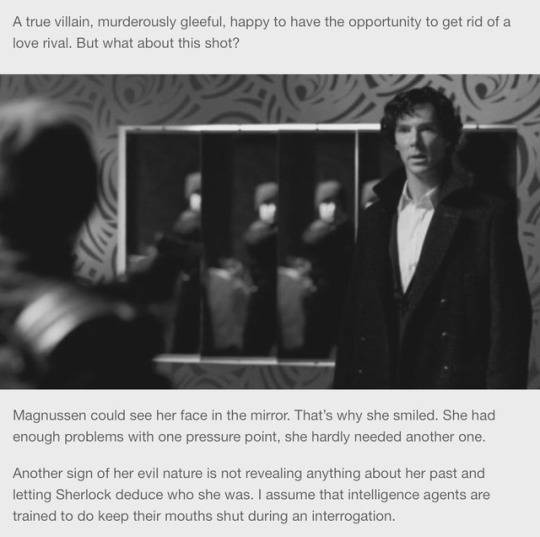
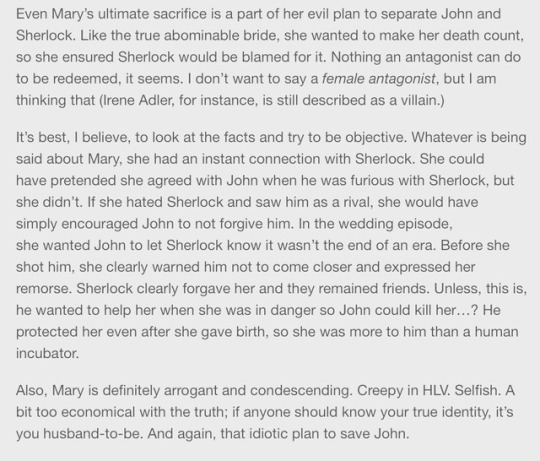

Okay, we’d like to go over some of our favorite parts of this post. Now, we’re not here to tell you that you absolutely have to hate Mary with every fiber of your being, because that’s an opinion for each person to decide on their own. We are just here to talk about why some of the reasoning in this particular post is laughable.
1. Right off the bat, it compares Johnlockers to the obnoxious boy in the scenario raising his voice at someone who disagrees. Lmao. We know what you guys think of Johnlockers. We don’t need to waste time proving that the hate against us is both hypocritical and blown out of proportion. For more info, simply search this blog. It’s just funny how ya’ll can never make any arguments against us without resorting to ad hominem attacks at least once. Or in this case, from the very beginning.
2. Mary’s “unforgivable sins.” The examples you give of us searching for any reasons to demonize her are…. not the best. You picked examples that made it easiest for you to say “See, look how reaching your arguments are!” You basically said we think she’s evil because she playfully teases Sherlock, tries to keep her family safe, and doesn’t reveal her identity right away. I think you know that there are much better examples to argue that Mary is not a good person, but you intentionally didn’t use them. You went for the smallest points in our argument instead and presented it like it was the core of it. To me, this shows that even you see the weakness in your own argument. And regarding Mary’s abandonment, John himself thought it was incredibly selfish of her to run off instead of working things out with him. His words, originally, not ours.
3. Mary’s smile. Now its my turn to call the argument reaching. I’d say, claiming Mary was smiling just so Magnussen wouldn’t have another pressure point on her is one interpretation you could use if you were desperately trying to make her actions in these scene less detestable. If you love Mary and want to think this to make yourself feel better about her, go right ahead. Make it your fanon. But claiming that it’s a cold, hard fact? Nope, nice try. There’s nothing in that scene to suggest that that smile was only for Magnussen. That’s your personal headcanon, and there is a difference between that and canon.
4. “A large number of people claim they hated Mary before His Last Vow…However, if she was disliked before she actually deserved that, what does it say about those fans?” It’s not a crime to dislike a character. Johnlockers are held to this ridiculous standard of not being allowed to speak a single negative word about any character (esp. a woman). Why aren’t other fans held to the same standard? Why is it okay for Sherl0llians (and sometimes Adl0ckers too) to vehemently and openly hate John with everything in their soul? They are never accused of hating someone for getting in the way of their ship or being biased in their opinions. On the flip side, how come no one is making this same argument about ppl who loved Mary? There are people who loved her right from the start, and throughout everything afterwards (the assassin reveal, the shooting, the lying, the abandonment, the belittling, the selfishness…), she remained a saint in their eyes. How is this different from someone disliking Mary from the start and holding onto that opinion no matter what?
5. “Nothing an antagonist can do to be redeemed, it seems. I don’t want to say a female antagonist, but I am thinking that (Irene Adler, for instance, is still described as a villain.)” *claps for you* Omg what an original argument to make against the big, bad misogynistic Johnlockers! I’ve never ever heard that one before! … Shucks, and here I was thinking I was reading a well-written, organized post that for once didn’t resort to calling Johnlockers sexist for no reason. And about Irene, she may not have necessarily been a villain, but she was an antagonist. She was a force working against Sherlock throughout ASiB. She worked for Moriarty. She was a adversary for him. Does that make her a horrible, evil person? No. But don’t act like it’s a crime to call her what she is. An antagonist. And chances are, if someone uses the word “villain” instead of antagonist or adversary, it’s probably just a word preference. It’s not that deep fam.
6. “It’s best, I believe, to look at the facts and try to be objective.” Okay, then let’s look at all her crimes and despicable acts that you left out of your earlier arguments. Wait… but that would tear apart the point you’re trying to make.
7. Before she shot him, she clearly warned him not to come closer and expressed her remorse. Aka: It’s okay to shoot your friend (who is offering to help you) in the chest just because they bet on you having a conscience and decided to take a step closer to you. And afterwards, it’s best to express your remorse by threatening to shoot them again when you think no one is looking.
8. “Sherlock clearly forgave her and they remained friends” See here’s the thing. We were never actually shown this. We were shown Sherlock escaping dying at her hands a second time, then John making up with her with that ominous, carefully worded, possibly double-edged “The problems of your future are my privilege.” Then Sherlock shot Cam to keep John and Mary safe (yes, John too). Then we got TAB, where Sherlock solved the mystery of a bride who shot people and envisioned John’s marriage going downhill. It was sublte, but throughout all that, there was always the very plausible possibility that there was something more going on. After all, it would’ve made a much better story than Mary trying to kill her supposed friend twice and John forgiving her, despite that decision going against all his previous character development. So yeah, it’s not a surprise (nor the viewer’s fault) for scratching their head when TST aired and Sherlock and Mary were suddenly besties. Something else to understand here re: s4: The question isn’t whether or not he forgave her. They made that pretty obvious. The question we simply have is why?? It’s not a crime to wonder about this instead of just accepting whatever the writers give us, especially when it has no consistency or sense behind it.
9. “She’s been criticised for her sass in HLV, after the shooting, when she dared not to grovel at John’s feet, begging for his forgiveness.” Ask yourself, does her little quip in HLV make you see her as a funny, quirky badass? Why? Genuinely ask yourself why. Why shouldn’t she ask his forgiveness for trying to murder his best friend in cold blood, and apologize like any semi-decent human being would have done? Why is it so “uwu cute and badass” that all she had to say about the situation were some snarky sarcastic comments? See, this is an example of Mary being able to do literally anything, and still be worshipped for it. She’s a woman and can therefore literally commit murder and its uwu so cute. I don't understand how saying “omg wow she tried to kill her friend and DARED to not apologize for it, you go girl!” is helping your argument that she’s really not so bad of a person. (It does, however, help the argument that she would have made an incredible, very interesting, and entertaining villain, so thanks for that).
10. “Regardless of Mary’s actions and her motivations, she was bound to be hated, simply because she was in a relationship with John.” *claps again* Ohmygod wow you are so smart, I have never heard anyone say that before. Jesus, can ya’ll simply make your argument for once without resorting to calling us sexist? Or insulting our intelligence by implying that we can’t tell the difference between someone getting in the way of our ship and someone being a despicable person who should not be worshipped and praised? And it’s funny cause i double some of ya’ll would love and stan her so much if she wasn't in a relationship with John. You guys just love being able to use that excuse. You love that she blocks Johnlock and you love her for existing to do just that. If she was just a random side character who shows up in S3, makes some snarky comments, becomes friends with them, and then tries to kill Sherlock, I doubt you guys would still feel the same about her.
11. “But when people demonise her and twist her every word to make her look like the evilest woman on earth, I have to disagree.” / “Mary is not as evil as some people think.” Listen, I agree. I don’t think every single thing she does is horrible. People can often be unfair when talking about her. Both in defending everything she does, and villainizing everything she does. I get it. But hating Mary or interpreting her as a villain is not a fucking crime. There are numerous reasons to support this reading, as you said yourself. I personally don’t see any redeeming qualities in her that make her a character worth forgiving or liking. If you want to argue that she’s not so bad of a person, go right ahead. But seriously, if you’re going to try to justify your reasoning for doing so, try to come up with some better reasons, because these are weak. As I said before, I don’t think every single thing she does is horrible. But I do think that, objectively, the bad about her far outbalances the good. Just try making a simple good/bad list of her traits and actions, weigh them fairly against each other, and tell me what conclusion you come up with. It’s really not a surprising thing (nor a crime) to dislike Mary or see her as a bad character. It’s common sense. At least that’s how I see it. But I’m just a stupid Johnlocker who is only interested in seeing dicks touch. What do I know
24 notes
·
View notes